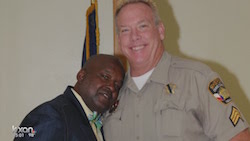After 32 years of service, the July 25 death of Travis County Deputy Sheriff Sgt. Craig Hutchinson made suicide real to our community at large. What better moment to try to better understand the complexities of suicide?
News reports paint a picture of a respected, even beloved member of the sheriff’s department. Sheriff Greg Hamilton publicly expressed his love for “Hutch,” the man who trained and mentored him, saying he was like a “big teddy bear.” By all accounts, his suicide came as a total shock to his coworkers and Hamilton.
Anecdotally and from research, we know that males in general are naturally predisposed to avoid seeking psychological help — especially first responders, who tend to have traditional family values with the male as the honorable, strong provider and protector who likely views psychological help as a sign of weakness.
Frontline law enforcement officers suffer trauma from the multiple sentinel events involving gunfire that they encounter, all too often caused by bad actors within their own force. Rather than seek help, they often fall silent, fearing stigma or being placed off duty with service revolvers taken away. (An an aside, our community just learned 50 years after the fact that it didn’t help to fall silent after the Charles Whitman shooting.)
Hutchinson, 54, was due to retire in September. It’s likely that during his career he suffered trauma, didn’t talk about it and became depressed and anxious. Symptoms typically include magnifying something small into something huge, feeling trapped and feeling they’re the only one who feels that way. They tend to isolate themselves and often self-treat with addictive behaviors. But they manage to pull themselves together at work.
It’s no wonder that more law enforcement officers die by suicide than in the line of duty, according to the International Association of Chiefs of Police. Compare their suicide rate of 17 against the national average of 12 per 100,000 population (National Center for Health Statistics). Like Hutchinson, officers who commit suicide are primarily married white males of a lower rank, such as sergeant.
The investigation found that Hutchinson was prescribed medication to treat anxiety and depression in December, but his autopsy revealed no trace of antidepressant in his blood. Did he stop taking his medication, unaware that antidepressants take three to six weeks to take effect?
The death investigation also found that Hutchinson, who made about $99,000 per year, had significant financial problems. His car was repossessed in June. On July 11, two weeks before his death, he received a foreclosure notice. His home off McNeil Road outside of Round Rock was to be put up for public sale on Aug. 2, the day that hundreds gathered for a hero’s funeral. To the sergeant, losing his car and home may have meant the ultimate symbol of failure, shame and disgrace.
It is possible to be suicidal and goal-directed at the same time. Once a plan is developed, often the individual becomes ebullient, which explains why the upbeat sergeant’s suicide stunned Sheriff Hamilton. The plan to make it look as if he died in the line of duty would achieve many goals. It would protect his name. With nearly $1 million in local, state and federal survivor benefits, it would provide for his family. And importantly, it would end his suffering.
In a recent press conference, Sheriff Hamilton tearfully stated a determination to help his staff. Many things can be done for all first responders at low or no cost. To name a few, conducting a professionally led staff debriefing session after each sentinel event; having counselors in line who specialize in trauma treatment for first responders; mandating yearly suicide inservices; and posting the National Suicide Prevention Lifeline — 800-273-TALK.
Mental health apps are a promising new treatment modality. They can help individuals understand, track, treat and cope with their conditions. They are free, easy to use on a smartphone or tablet and can be very effective for a variety of conditions including post-traumatic stress, anxiety and depression. The Anxiety and Depression Association of America website has reviews of these apps.
Sgt. Hutchinson’s suicide has brought a new awareness to our community. Let’s make something of it.
Inglis, a retired nurse, served on the Austin Travis County Integral Care Board of Trustees for 12 years. Minot is a psychiatric clinical nurse specialist practicing in Austin.



 Austin, Texas
Austin, Texas